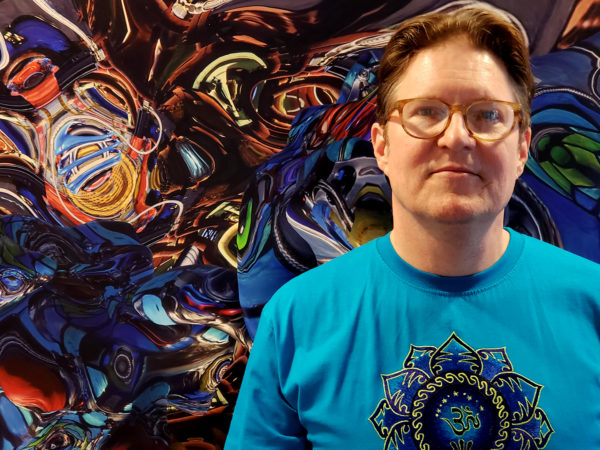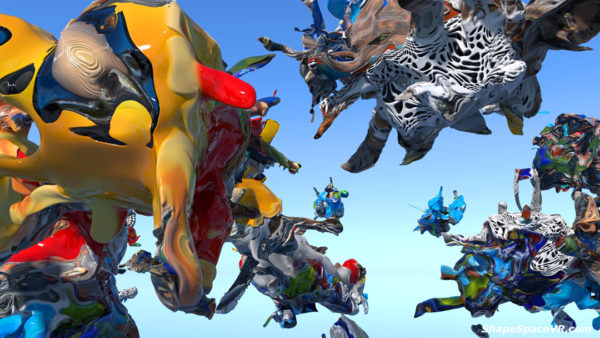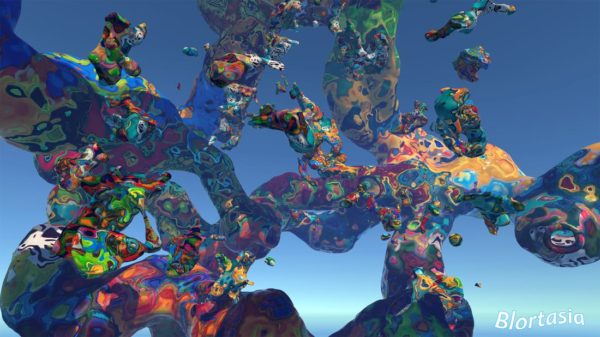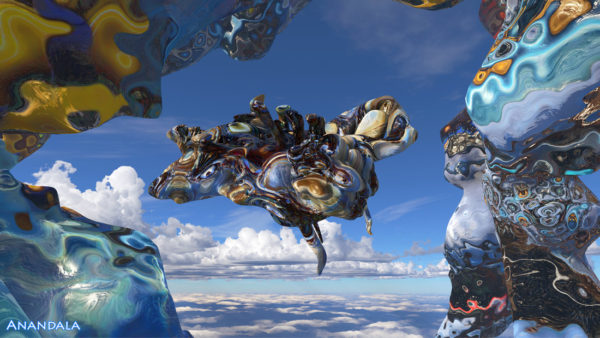
(Photograph courtesy of Snow Mack, and used with permission.)
Groundbreaking digital artist Kevin Mack uses virtual reality to transport people into a different world–or several.
And that statement barely does justice to his work.
Podcast: Play in new window | Download
Subscribe: RSS
Kevin could be described as a scientific artist–or perhaps an artistic scientist! In 1999, he received an Academy Award for visual effects, after pioneering the digital creation of the tree in “What Dreams May Come”. And in 2006, UCLA’s David Geffen School of Medicine gave him the title of Honorary Neuroscientist, as a result of his research and talks on perception and visualization.
But perhaps his recent virtual-reality work is the coolest yet.

“Zen Parade”, by Kevin Mack, ©2019. Image used with permission.
Using a spectrum of knowledge, including 3D printing and (in the case of his most complicated work) artificial intelligence, Kevin has created three VR experiences: Zen Parade, Blortasia and Anandala.
Strap on the headset–and you’re in the sky, flying at a speed you control. Expect to see lush, kaleidoscopic colors and evolving shapes as you explore.
Zen Parade takes you through an animated world of living sculptures, while Kevin’s Shape Space VR website describes Blortasia as “a surreal maze of evolving sculptures”.

“Blortasia“, by Kevin Mack, ©2019. Image used with permission.
And we can personally attest to the fact that Anandala is a fantastic experience!

“Anandala”, by Kevin Mack, ©2019. Image used with permission.
Anandala allows you to travel–at your own pace–through colorful, almost liquid-looking structures and tunnels. Once inside the shapes, you’ll encounter friendly living art entities. And you may well laugh out loud (we did!) at these denizens’ response to your presence!
Kevin’s goal, in creating these three works, is to invigorate, entertain and enhance the well-being of his viewers. But the medical profession has also been using his Zen Parade in two research studies.
Kevin talked about his background, the experience of creating his virtual-reality art and some of the neuroscience behind the perception experience.
On this edition of Over Coffee®, you will hear:
-
How Kevin’s growing-up years inspired his creativity and curiosity;
-
What first interested him in the technology of creating art;
-
How childhood visions led him to imagine the worlds he creates today;
-
His early experimentation with video and computers;
-
How Kevin wound up pioneering digital art for movie visual effects;
-
Kevin’s story of creating his first VR experience, Zen Parade;
-
What viewers will experience in his newest work, Anandala;
-
The artificial-life process involved in Anandala which enables the friendly art entities to communicate;
-
And, the story of the way this process enabled Kevin to digitally create the tree in What Dreams May Come, and the brain in The Fight Club;
-
How Zen Parade grew from a “cool abstract art experience” to an implement that can benefit the medical community;
-
What “the science of awe” involves, from a neuroscientist’s point of view;
-
Some of the resources Kevin recommends, to artists exploring VR;
-
Kevin’s vision for the future, with creating his VR worlds;
-
The concepts behind the artificial life he’s created, in Anandala, and the intelligent living creatures he looks forward to creating in the future.
